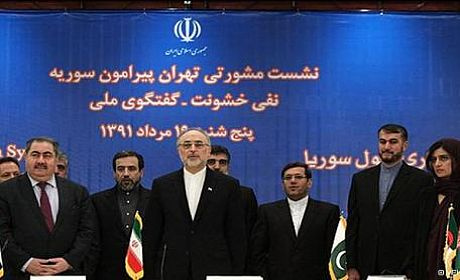Iran Searching for Solution in Syrian Crisis

Iranian Diplomacy: What was Iran's goal in holding the consultative conference on Syria?
Davood Hermidas Bavand: I think Iran's goal was to establish order in Syria's present situation, but it seems that it is now too late for this matter, for events have led to conditions which have rendered domestic order impossible in the present framework. Therefore, efforts were made to establish arrangements to end the crisis and the killing of people. But the consequences of the internal crisis and foreign relations have been drawn towards a direction where maintaining the present situation is very difficult.
ID: In your opinion, could this conference mean a change in Iran's view of the Syrian crisis?
DHB: Yes. On the surface, it can mean a change in method, but as was mentioned earlier, considering the present situation and developments and future possibilities, others do not view such a gathering as beneficial and believe that the result of these developments will have to lead to change. Therefore, they consider such measures useless. Mr. Salehi had said earlier that Iran is ready to mediate between the government and the opposition. But his proposal was not welcomed; hence, it seems now that it is too late to hold such a conference. In fact, while considering realities in the international scene, Iran must reassess the situation.
ID: To what extent, do you believe, has Iran reached the conclusion, considering the present situation in Syria, that Syria is about to collapse and crisis management must be done after this juncture?
DHB: In the next stage, a determining role will be played by those who have supported the people's movement, or in other terms, Syria's opposition. Therefore, considering Iran's position since the beginning of this crisis based on continuation of Bashar Assad's regime, I don't believe that we will be able to play any role in the next stage.
ID: Mr. Jalili in Syria and Mr. Salehi in Turkey have made great efforts for the freedom of Iranian hostages in Syria. How effective, in your view, is this event in changing Iran's outlook with regard to Syria's developments?
DHB: This is another issue. It is possible that Turkey or others play a role in winning the freedom of these hostages but it does not seem that this issue has been able to have an impact on Iran's view of Syrian developments. This is a humanitarian issue and, by mediating to gain these people's freedom, Turkey and other countries would serve their own interests. In my opinion, the situation in Syria will continue its path. This issue is threatening, because if they kill these hostages, as they have threatened to do so, Iran must react to this matter. This reaction would be aimed at those who commit these acts, meaning that Iran will probably become even more involved in Syria's swamp. Therefore, it seems that it is better to separate the issue of hostage-taking and attempt to win their freedom from a humanitarian aspect.
ID: In your opinion, how could Iran follow its national interests in the future of Syria in the best possible form?
DHB: Preventing more damages is always beneficial. In order to do this, a multi-faceted assessment is needed. Considering what Mr. Jalili has stated, it seems that Iran's position has not been reviewed. Apparently, Iran's policy is still based on supporting Bashar Assad. Although it is possible that, in the future, changes will be made in this position considering the trend of developments in Syria, it seems that even if Iran decides to change its position, it will attempt to not allow great changes to be made within Syria’s present framework.

